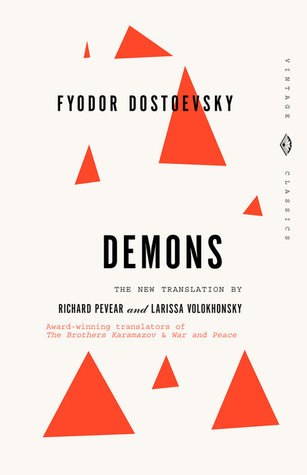More on this book
Community
Kindle Notes & Highlights
This negative conversion out of love for suffering humanity was not an ideological affectation for Dostoevsky, it was the central crisis of his life and would inform all his later work.
The demons are visible only in distortions of the human image, the human countenance, and their force is measurable only by the degree of the distortion.
The world of Demons—the provincial town with its society, its administration, its older and younger generations, its club members and revolutionaries—is in a condition similar to Ivan’s. The title is perhaps Dostoevsky’s message to us that “it is not them.”
The demons, then, are ideas, that legion of isms that came to Russia from the West: idealism, rationalism, empiricism, materialism, utilitarianism, positivism, socialism, anarchism, nihilism, and, underlying them all, atheism.
Ideas that deface or distort this “authoritative image of a human being” in a person are indeed acting like demons, and are them.
Seeking the greatest good, we do the greatest evil. The demons parody God’s world and invert its ends, playing for its loss.
She invented him, and she was the first to believe in her invention. He was something like a sort of dream of hers … But for that she indeed demanded a lot of him, sometimes even slavery. And she was incredibly resentful.
A cynical thought; but loftiness of constitution sometimes even fosters an inclination towards cynical thoughts, if only because of the versatility of one’s development.
Perhaps my irritation was petty and stupid; but shared isolation is sometimes extremely damaging to true friendship.
“But, all the same, to cross the ocean on an emigrant steamer to an unknown land, even if it’s with the purpose of ‘learning by personal experience’ and so forth, by God, that seems to have some big-hearted staunchness about it …
“And I, my dear, am not so afraid of the world’s opinion as some are; it’s you who, under the guise of pride, are trembling before the world’s opinion. And if there are only our own people here, it’s so much the better for you than if strangers heard it.”
the worse a man’s life is, or the more downtrodden and poor a whole people is, the more stubbornly they dream of a reward in paradise,
in this blindness of nobility, one suddenly takes a man in all respects even unworthy of one, profoundly lacking in understanding of one, who is ready to torment one at the first opportunity, and, contrary to everything, makes such a man into some sort of ideal, one’s dream, concentrates on him all one’s hopes, worships him, loves him all one’s life, absolutely without knowing why, perhaps precisely because he is unworthy of it
“My friend, the real truth is always implausible, did you know that? To make the truth more plausible, it’s absolutely necessary to mix a bit of falsehood with it. People have always done so.
And why is it that I speak a lot of words and it comes out wrong? Because I don’t know how to speak. Those who know how to speak well, speak briefly. So, there you have my giftlessness—isn’t it true? But since this gift of giftlessness is natural to me, why shouldn’t I use it artificially?
Reason has never been able to define evil and good, or even to separate evil from good, if only approximately; on the contrary, it has always confused them, shamefully and pitifully; and science has offered the solution of the fist.
“It must be true that the whole second half of a man’s life is most often made up only of habits accumulated during the first half.”
I looked at you all then: you’re all angry, you’re all quarreling; you get together and can’t even laugh from the heart. So much wealth and so little joy—it’s all loathsome to me. But, anyway, I don’t pity anyone now except my own self.”
“If the burden is light for me because of my nature, then maybe the burden is heavier for you because of your nature. Nothing to be much ashamed of, only a little.”
“And why not? You’re an intelligent man and, of course, not a believer yourself, but you understand only too well that you need belief in order to brutalize the people. Truth is more honest than lying.”
He got the upper hand with her only by yessing her with all his might from the very beginning in her dreams of influencing society and the ministry; by entering into her plans, devising them for her, acting through the crudest flattery, he entangled her from head to foot, and became as necessary to her as air.
Far more than his own happiness, it is necessary for a man to know and believe every moment that there is somewhere a perfect and peaceful happiness, for everyone and for everything … The whole law of human existence consists in nothing other than a man’s always being able to bow before the immeasurably great. If people are deprived of the immeasurably great, they will not live and will die in despair. The immeasurable and infinite is as necessary for man as the small planet he inhabits


